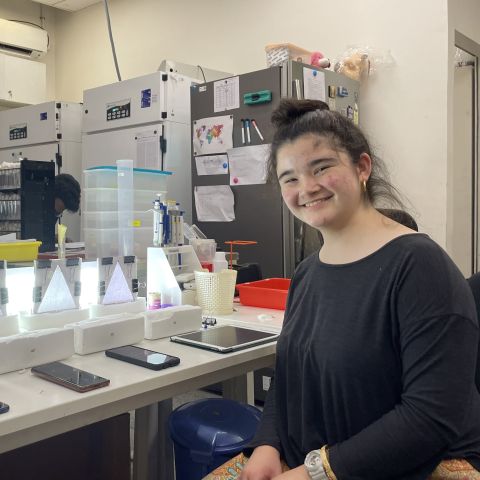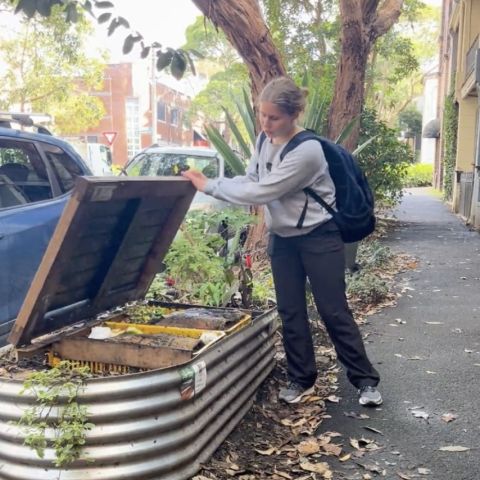South Asia Program
Information Session: Global Research Fellows

September 11, 2025
4:30 pm
Uris Hall, G08
Global Research Fellows are a new interdisciplinary research and professional development community at the Einaudi Center for advanced graduate students, Cornell postdocs, and visiting and local scholars. You'll find a community of fellow researchers with regional and international interests and a desire to foster a more equitable world.
Eligible students:
• Have completed at least two years of graduate education
• Engaged in research on a topic of global or regional studies significance
• Hold a strong desire to impact global challenges and create real-world solutions
• Interested in engaging and collaborating with other researchers
Can’t attend? Contact programs@einaudi.cornell.edu.
***
The Mario Einaudi Center for International Studies hosts info sessions for graduate and for undergraduate students to learn more about funding opportunities, international travel, research, and internships. View the full calendar of fall semester sessions.
Additional Information
Program
Einaudi Center for International Studies
Reppy Institute for Peace and Conflict Studies
East Asia Program
Southeast Asia Program
Latin American and Caribbean Studies
Institute for African Development
Institute for European Studies
South Asia Program
Migrations Program
Southwest Asia and North Africa Program
SAP 2025 Bulletin Now Available
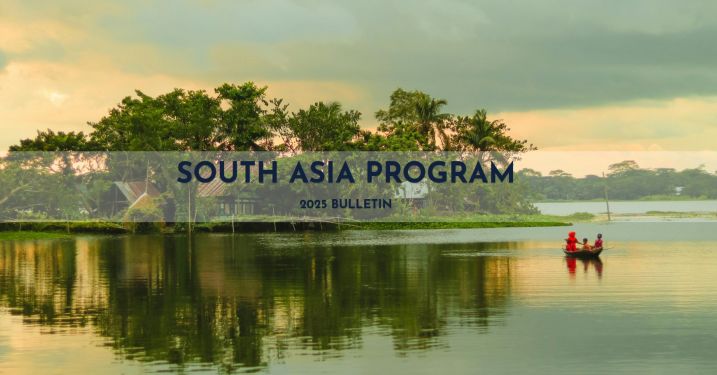
Our 2025 Bulletin includes articles about Afghan students at Cornell, a student's India internship, a Visiting Scholar's poem, and community college outreach.
Delta Futures: Time, Territory, and Capture on a Climate Frontier

October 20, 2025
12:15 pm
Uris Hall, G08
Talk by Jason Cons (Anthropology, University of Texas at Austin)
Delta Futures explores the competing visions of the future that are crowding into the Bengal Delta’s imperiled present and vying for control of its ecologically vulnerable terrain. In Bangladesh’s southwest, development programs that imagine the delta as a security threat unfold on the same ground as initiatives that frame the delta as a conservation zone and as projects that see its rivers and ports as engines for industrial growth. This talk, and the book upon which it is based, explores how these competing futures are being brought to life: how they are experienced, understood, and contested by those who live and work in the delta, and the entanglements they engender—between dredgers and embankments, tigers and tiger prawns, fishermen and forest bandits. These future visions produce the delta as a “climate frontier,” a zone where opportunity, expropriation, and risk in the present are increasingly framed in relation to disparate visions of the delta’s climate-affected future.
Jason Cons is an Associate Professor of Anthropology at the University of Texas at Austin. He is the author of Delta Futures (University of California Press, 2025) and Sensitive Space (University of Washington Press, 2016). He is the co-editor of Frontier Assemblages (Wiley) and is a member of the Limn editorial collective and an outgoing editor of South Asia: The Journal of South Asian Studies.
This presentation is supported by a grant from the Central New York Humanities Corridor
Additional Information
Program
Einaudi Center for International Studies
South Asia Program
Ante/ Anti-Border: Literatures of Resistance in India and Pakistan
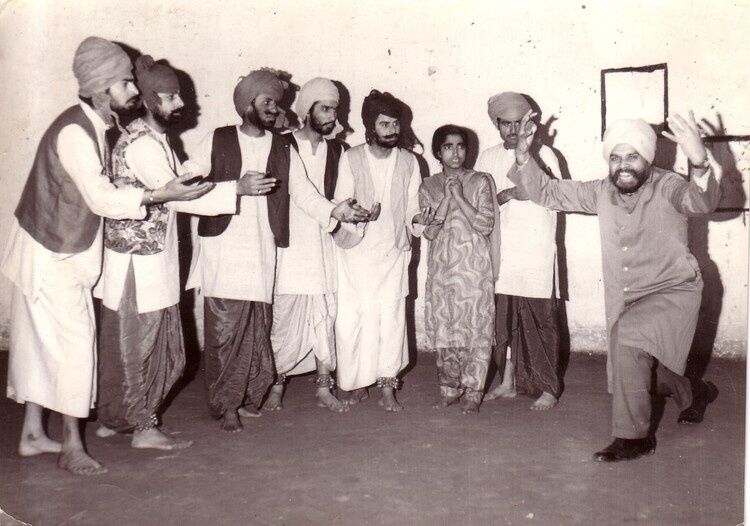
November 17, 2025
12:15 pm
Uris Hall, G08
Talk by Sara Kazmi (English, University of Pennsylvania)
This talk will focus on left, feminist, and anticaste literatures produced by radical intellectuals from Punjab, a border region split between India and Pakistan. I show how Punjabi writers deployed regional oral poetic and performative forms to critique caste, patriarchy, authoritarianism, and dominant religion in postcolonial South Asia. Focusing on Marxist playwrights Najm Hosain Syed and Gursharan Singh, the talk will analyze how they interpreted and referenced key genres embedded in poetic cultures that predate the national divide, like the Var of Dulla Bhatti, a historical ballad that celebrates 16th-century rebellions against the Mughal throne. In doing so, these authors responded to the rising significance of the peasant as a political actor in 1960s Punjab in both India and Pakistan, intervening in global debates around revolutionary transformation and decolonization. Moreover, they constituted a border-crossing literary practice that traversed, and indeed, actively challenged the colonially drawn boundary between the two nation-states.
Sara Kazmi is an Assistant Professor of English with affiliations in Comparative Literature and Literary Theory, and Gender, Sexuality, and Women's Studies. She is a scholar and translator whose work takes an interdisciplinary approach to the study of anticolonial, left, and oppositional literary production in the global south. Sara focuses on the Panjab region, and more broadly, on South Asia and South Asian diasporas, combining methods in literary studies, performance, and history to examine how marginal and vernacular writing engages planetary debates around decolonization, Marxism, and revolutionary transformation. Sara is also part of the Revolutionary Papers collective, which is a transnational research collaboration exploring 20th-century periodicals of left, anti-imperial, and anticolonial critical production. In addition to her work as a scholar, she is a performer and student of Indian classical music. She blends ragas with folk tunes in renditions of protest music from South Asia, some of which are archived at mein.beqaid (I, Uncaged). Prior to joining the University of Pennsylvania, Sara Kazmi was a Postdoctoral Fellow at LUMS University in Lahore, Pakistan. She received a PhD in Criticism and Culture at the Department of English, University of Cambridge, an MA in South Asian History at SOAS, London, and a B.A. (Hons) in Humanities from LUMS University.
Additional Information
Program
Einaudi Center for International Studies
South Asia Program
Book Introduction Workshop: Selective Welcome: Pakistani Hindus in India
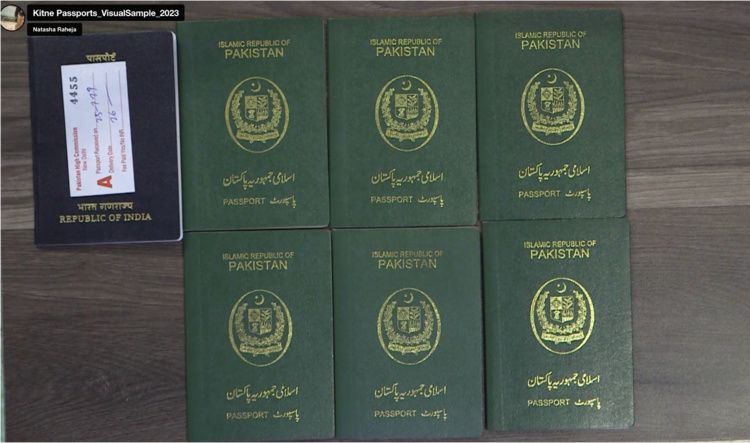
October 6, 2025
12:15 pm
Uris Hall, G08
Discussion with Sarah Thompson (Government, Cornell University), Sadia Mahmood (South Asia Program, Cornell University) and author Natasha Raheja (Anthropology and Performing & Media Arts, Cornell University)
Selective Welcome: Pakistani Hindus in India (Forthcoming, University of Chicago Press) explores the flexibility of minority-majority politics in the context of citizenship claims in South Asia. The book offers an ethnographic account of the migration of minoritized Pakistani Hindus to India, where they ostensibly become part of a religious majority. I argue that majority-minority politics in South Asia exceed state borders, in ways that are not nation-bound. Theorizing the ways that national majorities construct themselves as global minorities, and conversely, the ways that minorities imagine justice as majorities, I contend that liberal democracy's minority form does majoritarian work. As more and more national majorities consolidate authoritarian rule through imagining themselves as minorities under threat, this work makes an important contribution to scholarly conversations about political theory, migration, and borders across the humanities and social sciences.
Members of the Cornell community may read a draft of the book's introduction before the presentation (Cornell netID required to view).
Natasha Raheja is an Assistant Professor of Anthropology and Performing & Media Arts at Cornell University. She received her PhD in Anthropology from NYU and her BS in Biology and MA in Asian Languages and Literature with a focus on Urdu from UT Austin. Her projects explore questions of migration, belonging, and majority-minority politics in South Asia. Dr. Raheja is the director of Cast in India, an observational portrait of the Bengali metal workers who manufacture New York City manhole covers, and A Gregarious Species, an experimental, found-footage film featuring cross-border locust swarms in the Thar Desert region. She is also completing a book tentatively entitled Selective Welcome: Pakistani Hindus in India.
Additional Information
Program
Einaudi Center for International Studies
South Asia Program
Nidhi Mahajan, Moorings: Voyages of Capital Across the Indian Ocean

September 22, 2025
4:45 pm
Klarman Hall, Klarman Hall KG 42
FALL 2025
Monday, September 22, 2025
Klarman KG42
ICM NEW BOOKS SERIES
Moorings: Voyages of Capital Across the Indian Ocean
NIDHI MAHAJAN (Associate Professor of Anthropology, University of California, Santa Cruz)
The Institute for Comparative Modernities is thrilled to welcome Cornell alum Nidhi Mahajan '15 to campus for a talk about her recently published book Moorings: Voyages of Capital Across the Indian Ocean.
Moorings follows sailors from the Gulf of Kachchh in India as they voyage across the Indian Ocean on mechanized wooden sailing vessels known as vahans, or dhows. These voyages produce capital through moorings tht are spatial, moral, material, and conceptual. With a view from the dhow, the book examines the social worlds of Muslim seafarers who been rendered invisible even as they maneuver multiple regulatory regimes and the exigencies of life, navigatiing colonialism, neoliberalism, the rise of Hindutva, insurgency, climate change, and border regimes across the ocean. Based on historical and ethnographic research aboard ships, at ports, and in religious shrines and homes, Moorings shows how capitalism derives value from historically sedimented practices grounded in caste, gender, and transregional community-based forms of regulation.
BIO
Nidhi Mahajan is Associate Professor of Anthropology at UC Santa Cruz. She was recently the inaugural Fatema Mernissi Postdoctoral Fellow in Social and Cultural Studies at The Africa Institute, Sharjah, UAE, where she continued research on a new project that examines multiple contestations over belonging and notions of sovereignty in contemporary coastal Kenya. Mahajan is also a practicing artist and has developed multi-media exhibitions for the Fort Jesus Museum in Mombasa, Khoj International Artists’ Association in New Delhi and the 2019 Sharjah Architecture Triennial.
Additional Information
Program
South Asia Program
Apostles of Development: Six Economists and the World They Made
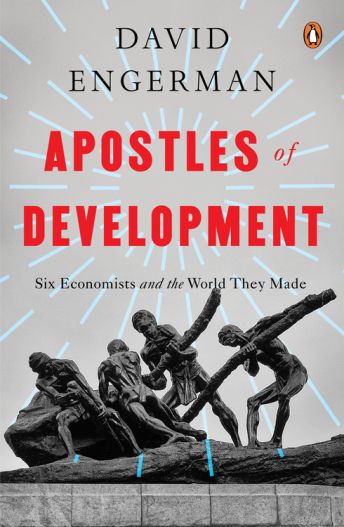
December 1, 2025
12:15 pm
Uris Hall, G08
Talk by David Engerman (History, Yale University)
Apostles of Development offers a history of international development through the lives and work of six South Asian economists who all studied together in Cambridge in the 1950s. They were an illiustrious group, with long careers and many succeses: winning a Nobel Prize (Amartya Sen), spending a decade as Prime Minister of India (Manmohan Singh), inventing the Human Development Index (Mahbub ul Haq), becoming a leading economist of international trade (Jagdish Bhagwati), agitating for independent Bangladesh (Rehman Sobhan), and helping create the modern Sri Lankan economy (Lal Jayawardena).
David C. Engerman, Leitner International Interdisciplinary Professor of History and Global Affairs, teaches international history at Yale University. Between receiving his Ph.D. from the University of California-Berkeley in 1998 and joining Yale in 2018, he was on the faculty at Brandeis University. In 2016, he served as elected president of the Society for Historians of American Foreign Relations. He is the author of four books – Modernization from the Other Shore; American Intellectuals and the Romance of Russian Development (Harvard, 2003), Know Your Enemy: The Rise and Fall of America’s Soviet Experts (Oxford, 2009), The Price of Aid: The Economic Cold War in India (Harvard, 2018), and most recently Apostles of Development: Six Economists and the World They Made (Penguin/Random House-India, Oxford, 2025); he is also the editor or coeditor of multiple collections, including a volume of the new Cambridge History of America and the World.
Additional Information
Program
Einaudi Center for International Studies
South Asia Program
Deities of Diet and Design: Hindu Gods and the Aestheticization of Thai-American Restaurant Art

September 25, 2025
12:15 pm
Kahin Center
Gatty Lecture Series
Join us for a talk by Aditya Bhattacharjee, Mellon Postdoctoral Fellow from Asian Studies at Cornell University.
This Gatty Lecture will take place at the The Kahin Center, 640 Stewart Ave. Lunch will be served. For questions, contact seapgatty@cornell.edu.
About the Talk
My presentation shares ethnographic vignettes from an ongoing investigation of the religious lives of Thai-American restaurateurs in different locations across New York state. More specifically, I center this population’s interactions with the rising popularity and worship of Hindu gods in their predominantly Buddhist homeland. Drawing on interviews with Thai-American restaurant owners and observations of the artwork that decorates their businesses, I explore how new trends in popular Thai religion have influenced the beliefs and business practices of residents in the Empire State’s primary Thai enclaves.
By taking note of the frequency with which paintings and icons of Hindu figures like Ganesha, Brahma, and Lakshmi are grouped with Southeast Asian and Chinese deities like Nang Kwak, Thao Wetsuwan, Guan Yin Pu Sa, and charismatic Buddhist monks on the Thai restaurant altar setting, my talk uses a material analysis of such design-work to raise three related questions: (1) Are Thai-Americans performing Thai-ness by incorporating Indian deities within their religious repertoires?; (2) What kind of experience does the Thai-American restaurateur wish to convey to clients by creating a dining aesthetic inflected by Hindu iconography?; and (3) How might we re-think notions of cultural appropriation in contemporary times by engaging with case studies, like those considered in this talk, that are curated by Asian Americans following patterns of emerging religious syncretism in their homelands?
Additional Information
Program
Einaudi Center for International Studies
Southeast Asia Program
South Asia Program
Finding South Asia in the Library: Library Orientation for Graduate Students
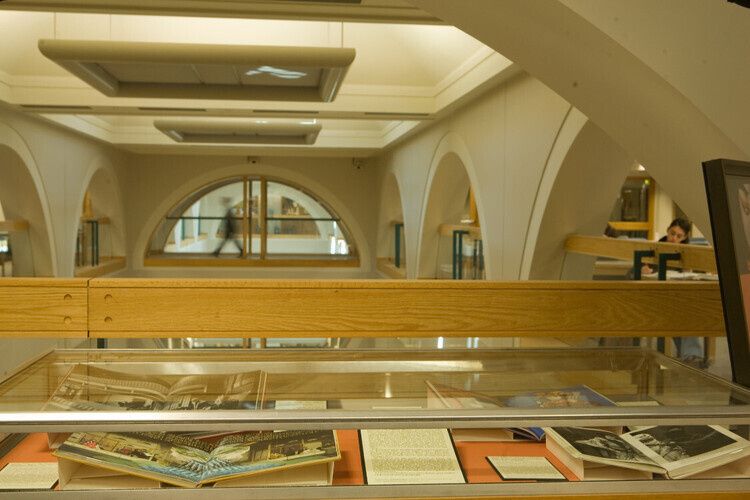
September 3, 2025
4:30 pm
Olin Library, 108
South Asia Librarian Kelsey Utne will introduce graduate students to resources available through the Cornell University Library for doing research on South Asia.
Additional Information
Program
South Asia Program
Global Internships
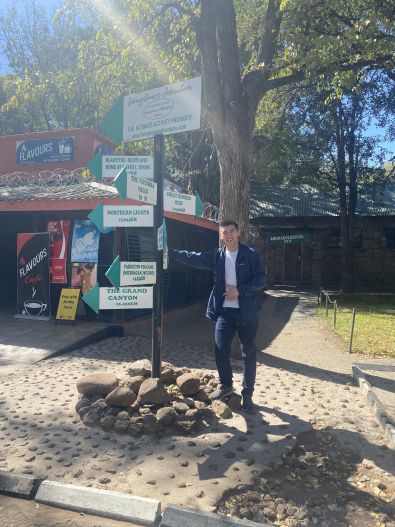
Details
Gain valuable international experience with a Global Internship! As an intern, you'll meet mentors and colleagues working in the international arena and advance your career goals.
Our Global Internships span the globe with placements at Cornell Global Hubs partner universities, community nonprofits and NGOs, and global practitioners partnering with Einaudi's regional and thematic programs. We offer internships specializing in global development, climate and sustainability, international relations, communication, business, governance, and more.
Many opportunities have several openings, giving you a chance to intern abroad next summer with fellow Cornellians.
What You'll Learn
How to Be a Global Citizen
"My internship helped me to strengthen my sense of cultural awareness, intercultural communication, and empathy."—Haruna Floate '26
How to Think Internationally
"In university, we are often taught U.S.-centric views, which can be limiting as environmental problems are global."—Hadley Flanagan '26
How to Adapt in New Places
"The number one lesson I got from the experience was the importance of being teachable. I had to go outside of my comfort zone."—Eliana Amoh '26
Funding Amount
All Global Interns receive an award to cover the estimated costs for airfare, transportation, and living expenses. A portion of the stipend may be paid directly to the in-country host to support housing, food, and local transportation. Find specific funding information under the "cost" tab on each internship’s Experience page.
How to Apply
Find out how to apply then continue exploring internship options and start your application on Experience.
Deadline and Decision
Deadline extended: Select internships are still accepting applications. Apply by January 15. We notify applications of decisions by late February.
Questions?
Joshua Kennedy is the Global Internships advisor. Select "Global Internships" in Cornell Chatter to schedule an appointment. You can also reach out by email with questions.
Meet Past Global Interns
Hear from our past interns on the Global Cornell YouTube channel.
Additional Information
Funding Type
- Internship
Role
- Student

